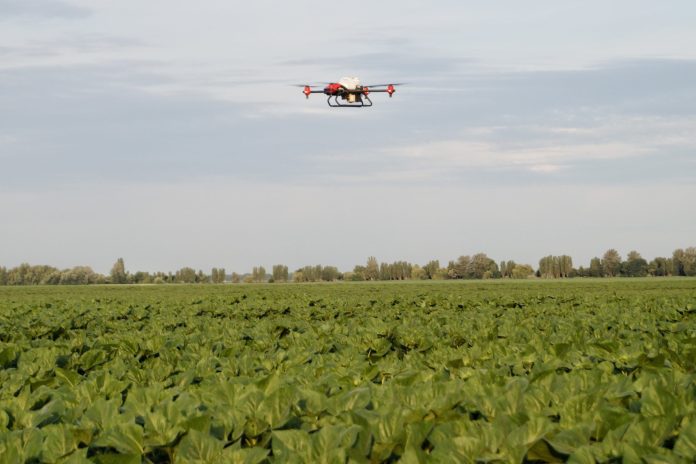Blog entry by Bruce McPherson

To ensure that sunflower crops will thrive under abnormal weather patterns, fleets of XAG Agricultural Drones have been conducting urgent, timely crop spraying operations in multiple regions of Ukraine. As heavy rains pour in, drone technology can top up the domestic under-equipped agricultural sector facing decline in sunflower crop yield and tight seed availability. This is expected to help safeguard a sufficient global supply of sunflower oil, as well as strengthening Ukraine’s lead as the “breadbasket of Europe”.
Since capturing the Ukraine market at the end of 2020, XAG has rapidly expanded its agricultural drones into varied sustainable farming practices that cover oilseed, corn, wheat, barley, and other grain crops. The spray drones are widely used in cultivated sunflower crops which account for over 20% of Ukraine’s arable land area. Ukraine is known as the world’s largest sunflower oil producer and exporter.
Cultivating Climate-resilience on Farm
During this wet season in July, Ukraine’s sunflower cultivation makes its way into the vegetative stage, with growers on the outlook for foliar diseases such as sunflower rust. Through a nationwide sales and service networks, XAG agricultural drones have been deployed for fungicide applications with high precision, which are urgent and arduous to prevent large-scale yield loss. The autonomous drone operations to spray fungicide was led by ZigZag Solutions and AgroCopter as XAG sub-dealers in Ukraine.
As adverse weather conditions become more frequent due to climate change, significant precipitation could lead to an outbreak of infectious crop diseases caused by fungi, bacteria, and viruses. It also brings out incapability of traditional ground machinery that is difficult to enter the wetland. In the past, agronomists had no other option but to delay operation and later increase pesticide doses as a result of skipping the optimal time to spray.
When classic self-propelled tractors are declined to help, drones can be nimble emergency helpers for Ukrainian farmers. They react much faster and are able to perform spraying right after rains in the inaccessible sunflower wetlands, with less chemical use and zero damage on soils. Having flight speed, height, and droplet size all set up on mobile app, the pilot instructed XAG agricultural drones to spray from 4 metres above the canopy on the pre-programmed path. One drone can cover up to 18 hectares of sunflower farmlands in only one hour.
Sunflower is one of the most important cash crops that offer the best profitability to Ukrainian farmers. It can be used to produce seeds, animal feed and oil with many health benefits as it is low in saturated fat and high in essential fatty acids. However, the 2020/21 sunflower yields in Ukraine decreased by 15% because of a prolonged drought, while the sunflower seed stocks fell to five-year low this February following the second highest levels of crushing activity on record.
Farmers in Ukraine are now turning to drones for closing the yield gap in sunflower harvest while reducing production costs and fossil fuel consumption. “Drones can work on long-stalk crops without damaging them. This creates a huge opportunity for farmers and a high return of investments,” said Valerii Iakovenko, Co-founder of Drone UA who is XAG’s official partner in Ukraine.
“We have totally positive feedback from farmers, during this rainy season drones were the only solutions in many cases. It is a revolutionary new and effective instrument, and more farmers understand that spraying drones are the real tools and XAG is the best of them.”
A Yellow Bumper Harvest Ahead
Ukraine is one of the largest global grain and forage crop producer which plays a major role in feeding the world’s growing population. However, farmers have been incurring relatively rising production costs and higher levels of yield loss, while bearing the brunt of climate impacts. According to World Data Center Ukraine, farm managers estimate that 10 to 20 percent of the standing crops are typically lost due to outdated, inefficient machinery.
As Ukraine is marching its way into a global agricultural powerhouse, the demand for high-tech farming equipment witnesses a continuous high growth now and in the future. Specifically, when farmers have problems entering the field due to crop height and heavy rainfalls, XAG’s AI-controlled agricultural drones can be applied to various stages of sunflower cultivation. This April, after the sunflower seeds were sown until they germinated, drones were sent to remove herbicides on the field to prevent weeds from competing nutrients, water, and sunlight with the seedlings.
At the upcoming flowering and pre-harvest season, XAG drones will fly into the blooming bulk of sunflowers for fungicide spraying and desiccation. The sunflower plant height can reach over 2 meters at this stage, when it was mostly impossible to spray in the past because of the lack of high-clearance machinery.
It is anticipated that Ukrainian farmers can reap an additional up to 10% of harvest using drones that do not cause any damage to crop. Getting the sunflower harvested several weeks early can result in higher yields and lower drying costs. Drones can be the ideal helpers to spray harvest-aid desiccant for speeding up the dry-down process and decreasing crop losses due to inclement weather, lodging, diseases, and bird depredation.
Besides its trademark yellow flower, a bumper sunflower harvest can contribute to brightening the future of global edible oil supply. Drones can be the optimal solution on sustainably boosting sunflower yield and making farming more resilient to climate change.
About XAG
Founded in 2007, XAG is a world-leading robotics and AI company, as well as the world’s largest agricultural drone maker. With the mission of advancing agriculture, it focuses on using technology to empower agriculture and help create a food-secure future. Up to December 2020, XAG’s smart agriculture technologies and solutions have reached 42 countries and regions, serving 9.31 million farmers and 52 million hectares of farmlands.